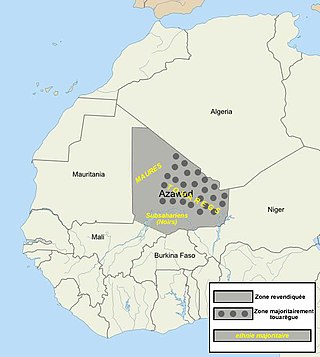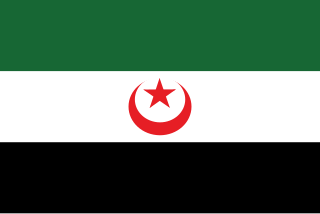
Azawad, or Azawagh, was a short-lived unrecognised state lasting from 2012 to 2013. Azawagh (Azawaɣ) is the generic Tuareg Berber name for all Tuareg Berber areas, especially the northern half of Mali and northern and western Niger. The Azawadi declaration of independence was declared unilaterally by the National Movement for the Liberation of Azawad (MNLA) in 2012, after a Tuareg rebellion drove the Malian Armed Forces from the region.

Kidal is a town and commune in the desert region of northern Mali. The town lies 285 km (177 mi) northeast of Gao and is the capital of the Kidal Cercle and the Kidal Region. The commune has an area of about 9,910 km2 (3,830 sq mi) and includes the town of Kidal and 31 other settlements.

The 2012 Tuareg rebellion was the early phase of the Mali War; from January to April 2012, a war was waged against the Malian government by rebels with the goal of attaining independence for the northern region of Mali, known as Azawad. It was led by the National Movement for the Liberation of Azawad (MNLA) and was part of a series of insurgencies by traditionally nomadic Tuaregs which date back at least to 1916. The MNLA was formed by former insurgents and a significant number of heavily armed Tuaregs who fought in the Libyan Civil War.

The National Movement for the Liberation of Azawad or the Azawad National Liberation Movement, formerly the National Movement of Azawad, is a political and military organization based in Azawad in northern Mali.

Ansar Dine (Arabic: أنصار الدين ʾAnṣār ad-Dīn, also transliterated Ançar Deen; meaning "helpers of the religion" also known as Ansar al-Din was a Salafi jihadist group led by Iyad Ag Ghaly. Ansar Dine sought to impose absolute sharia across Mali. The group took over the city of Timbuktu in 2012, which prompted the French-led intervention, Operation Serval.
Iyad Ag Ghaly, also known as Abū al-Faḍl, is a Tuareg militant from Mali's Kidal Region. He has been active in Tuareg rebellions against the Malian government since the 1980s – particularly in the early 1990s. In 1988, he founded the Popular Movement for the Liberation of Azawad. In the latest episode of the Tuareg upheavals in 2012, he featured as the founder and leader of the Islamist militant group Ansar Dine.

Bilal Ag Acherif is the Secretary-General of the National Movement for the Liberation of Azawad (MNLA) and president of a briefly independent Azawad.

The Battle of Gao was fought between the National Movement for the Liberation of Azawad (MNLA) and the Islamist Movement for Oneness and Jihad in West Africa (MOJWA), along with its ally Ansar Dine, in Gao between 26–28 June 2012. By the 28 June, Gao, Timbuktu and Kidal, the three biggest cities in the disputed secessionist region of Azawad within what is recognised as Malian territory, were under the control of Ansar Dine and its Islamist allies.

The Mali War is an ongoing, armed conflict that started in January 2012 between the northern and southern parts of Mali in Africa. On 16 January 2012, several insurgent groups began fighting a campaign against the Malian government for independence or greater autonomy for northern Mali, which they called Azawad. The National Movement for the Liberation of Azawad (MNLA), an organization fighting to make this area of Mali an independent homeland for the Tuareg people, had taken control of the region by April 2012.

The Second Battle of Ménaka was the last battle fought by the state of Azawad, as they were defeated by an Islamist coalition.
The Battle of Aguelhok occurred when rebels from the National Movement for the Liberation of Azawad (MNLA) and Islamists groups Ansar Dine and Al-Qaeda in the Islamic Maghreb attacked a Malian army garrison base in the town of Aguelhok, Kidal Region of Northern Mali on 17 January 2012, as part of the larger Tuareg rebellion to seize all government bases in the region.

Operation Serval was a French military operation in Mali. The aim of the operation was to oust Islamic militants from the north of Mali, who had begun a push into the center of Mali.

The following is a timeline of major events during the Northern Mali conflict.
The Battle of Khalil took place on 22–23 February 2013 and was part of the Northern Mali conflict, the battle began on the 22nd with two suicide bombings.

Chadian intervention in northern Mali refers to military intervention by Chad during the Mali War. Since its first deployment, the Chadian military has suffered 100 casualties.

The Arab Movement of Azawad is an Arab military organization active in Azawad/northern Mali. Initially known as the National Liberation Front of Azawad, it was formed in early 2012, during the 2012 Tuareg rebellion. The MAA claims to be a secular, non-terrorist organization, whose main objective is to defend the interests of the Arab peoples of northern Mali. It is reportedly willing to "work with France against terrorism, drug trafficking and organized crime" in the region. The group calls for granting substantial autonomy to northern Mali.
The following lists events that happened during 2013 in the Republic of Mali.
The first battle of Menaka is an attack led on January 17, 2012, by armed groups of the National Movement for the Liberation of Azawad (MNLA) and marks the beginning of the Tuareg rebellion of 2012. This is the first in a series of battles aimed a capturing most of the north Mali from the army by the rebels.
The Ambush of Tagarangabotte took place during the Internal conflict in Azawad. A MUJAO column en route to Menaka fell into an ambush by the MNLA.
The Battle of Idelimane took place during the Internal Conflict in Azawad.











